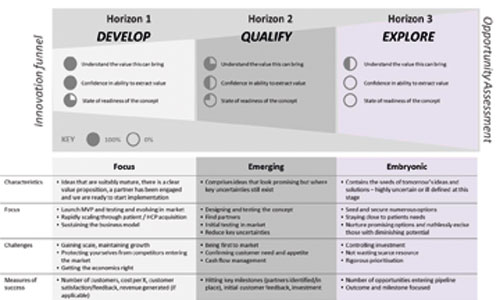 Going ‘beyond the pill’ has become a hackneyed saying in the Life Sciences industry over the past few years, with a lot of talk but little action. Where there has been action it has failed to deliver on a significant scale. Successfully innovating in ‘non-traditional’ ways is difficult and requires a clear vision and strong leadership from the top to challenge the ‘muscle memory’ that has been built up over the past 20 years. Companies that are able to successfully innovate at scale have a laser focus on their customer’s main issues and work in partnership with them to benefit the entire health ecosystem. Obsessing over customers’ needs is the only way to continuously maintain a healthy pipeline of innovative ideas which is grounded in real patient insight which directs ideation and proposition development. Leading innovators focus on getting four key things right:
Going ‘beyond the pill’ has become a hackneyed saying in the Life Sciences industry over the past few years, with a lot of talk but little action. Where there has been action it has failed to deliver on a significant scale. Successfully innovating in ‘non-traditional’ ways is difficult and requires a clear vision and strong leadership from the top to challenge the ‘muscle memory’ that has been built up over the past 20 years. Companies that are able to successfully innovate at scale have a laser focus on their customer’s main issues and work in partnership with them to benefit the entire health ecosystem. Obsessing over customers’ needs is the only way to continuously maintain a healthy pipeline of innovative ideas which is grounded in real patient insight which directs ideation and proposition development. Leading innovators focus on getting four key things right:
1. Obsessing over solving your customer’s biggest problems
The NHS is facing a funding crisis with 88% of acute NHS Trusts facing a financial deficit by the end of 2015/16. Expectations around quality of care have never been so high and with CQC inspections dominating the headlines, the perception is that healthcare quality is on the decline with ‘three in four NHS hospitals failing’. Pharma needs to embed itself in the broader ecosystem and understand the myriad things the NHS and its customers are trying to balance. Understanding this context – the priorities of its customers – and anchoring around these is key. Only by getting close to the issues and becoming a trusted partner can Pharma really understand the problems and be part of the solution. Pharma is in a unique position to take an end-to-end patient-centric approach to focus on patient needs, dissatisfactions and inefficiencies resulting from a fragmented healthcare system and leverage leading technologies and service design to tackle these needs.
2. Using the voice of the customer to direct ideation
As in development, iteration is essential so that propositions are founded on market intelligence and patient need, and harness the most viable and complementary partners. It is important to adopt a ‘no idea is a bad idea’ mentality for ideation sessions and capture insight from every possible source including your own organisation and other industries. Service concepts can then be created to guide the market scan process to identify potential partners and then flesh out the business model with a clear view of how value will be created, delivered and captured.
3. Applying transparent and impartial assessment
How innovation is measured in this space is critical to its success. Evaluation criteria need to be broader than traditional financial metrics such as NPV and IRR, which will often kill innovative ideas before they have had time to develop. Measures should focus on the areas of win-win between the NHS, HCP, patient and pharma, and typically be milestone-based in the early days. Tools can be developed that support the assessment of opportunities in terms of the value to the healthcare system, the ease of implementation and the potential to deliver a strong return to the company. It is really easy to add value to the healthcare system but very hard to extract value – having the right measures help ensure that value creation is a two-way system.
4. Building partnerships to develop propositions
The most agile and successful innovators don’t try to build everything themselves but tap into specialist skills and technologies that already exist in the market. Leaders adopt a ‘partner before build’ principle that benefits them in terms of minimising risk, the cost of development and speed to market. For innovation to be sustainable Pharma must commit to putting the critical enablers of effective innovation in place so it doesn’t become a one-off thing. To do this Pharma must maintain a constant flow of opportunities to be explored, qualified if viable and then developed (see diagram). This enables the development of a six-month sprint cycle to develop the most viable and valuable propositions. By developing structured innovation programmes Pharma companies have the opportunity to sure-footedly experiment in innovation, build its capability and deliver a return. This approach saves costs, builds strong relationships in the market and proves the concept of a larger innovation business to the board.
The industry is going through a period of rapid change and there is growing evidence that the winners will be those who understand their customers the best, become their trusted partners and consistently deliver a broader value proposition and innovation to tackle their customers’ biggest issues. The healthcare system is full of opportunity for innovation that delivers a win-win for all with the first movers quickly emerging as the leaders.

Aaron Bean is a director, Daryl Perry is a manager and Max Higgins is a senior consultant at Life Sciences at EY Advisory





